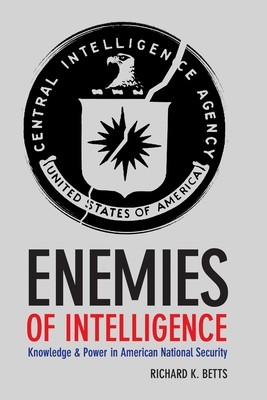
- We will send in 10–14 business days.
- Author: Richard Betts
- Publisher: Columbia University Press
- ISBN-10: 023113889X
- ISBN-13: 9780231138895
- Format: 14.4 x 22.1 x 1.6 cm, minkšti viršeliai
- Language: English
- SAVE -10% with code: EXTRA
Reviews
Description
Combining study with experience, Richard K. Betts draws on three decades of work within the U.S. intelligence community to illuminate the paradoxes and problems that frustrate the intelligence process. Unlike America's efforts to improve its defenses against natural disasters, strengthening its strategic assessment capabilities means outwitting crafty enemies who operate beyond U.S. borders. It also requires looking within to the organizational and political dynamics of collecting information and determining its implications for policy.
Betts outlines key strategies for better intelligence gathering and assessment. He describes how fixing one malfunction can create another; in what ways expertise can be both a vital tool and a source of error and misjudgment; the pitfalls of always striving for accuracy in intelligence, which in some cases can render it worthless; the danger, though unavoidable, of "politicizing" intelligence; and the issue of secrecy& mdash;when it is excessive, when it is insufficient, and how limiting privacy can in fact protect civil liberties. Grounding his arguments in extensive theory and policy analysis, Betts takes a comprehensive and realistic look at the convergence of knowledge and power in facing the intelligence challenges of the twenty-first century.
EXTRA 10 % discount with code: EXTRA
The promotion ends in 23d.03:41:11
The discount code is valid when purchasing from 10 €. Discounts do not stack.
- Author: Richard Betts
- Publisher: Columbia University Press
- ISBN-10: 023113889X
- ISBN-13: 9780231138895
- Format: 14.4 x 22.1 x 1.6 cm, minkšti viršeliai
- Language: English English
Combining study with experience, Richard K. Betts draws on three decades of work within the U.S. intelligence community to illuminate the paradoxes and problems that frustrate the intelligence process. Unlike America's efforts to improve its defenses against natural disasters, strengthening its strategic assessment capabilities means outwitting crafty enemies who operate beyond U.S. borders. It also requires looking within to the organizational and political dynamics of collecting information and determining its implications for policy.
Betts outlines key strategies for better intelligence gathering and assessment. He describes how fixing one malfunction can create another; in what ways expertise can be both a vital tool and a source of error and misjudgment; the pitfalls of always striving for accuracy in intelligence, which in some cases can render it worthless; the danger, though unavoidable, of "politicizing" intelligence; and the issue of secrecy& mdash;when it is excessive, when it is insufficient, and how limiting privacy can in fact protect civil liberties. Grounding his arguments in extensive theory and policy analysis, Betts takes a comprehensive and realistic look at the convergence of knowledge and power in facing the intelligence challenges of the twenty-first century.


Reviews